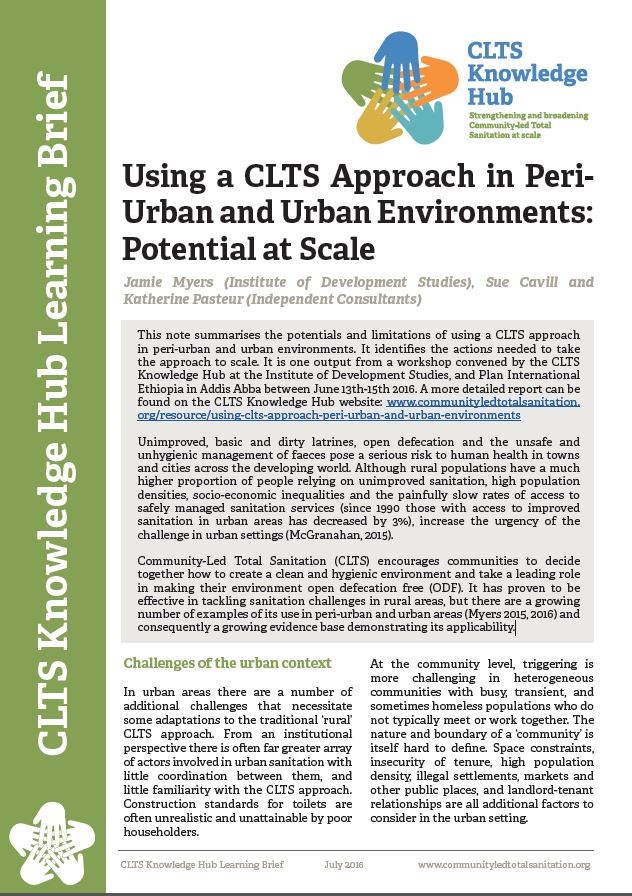Using a CLTS Approach in Peri-Urban and Urban Environments: Potential at Scale
 |
note Jul 2016 ; 4 pages
Aut. Sue Cavill & Jamie Myers & Katherine Pasteur
Ed. IDS - Brighton
Téléchargeable sous format: PdF
Téléchargeable chez l'éditeur
Site internet: www.communityledtotalsanitation.org/
Résumé:
This note summarises the potentials and limitations of using a CLTS approach in peri-urban and urban environments. It identifies the actions needed to take the approach to scale. It is one output from a workshop convened by the CLTS Knowledge Hub at the Institute of Development Studies, and Plan International Ethiopia in Addis Abba between June 13th-15th 2016. A more detailed report can be found on the CLTS Knowledge Hub website: www.communityledtotalsanitation. org/resource/using-clts-approach-peri-urban-and-urban-environments.
Unimproved, basic and dirty latrines, open defecation and the unsafe and unhygienic management of faeces pose a serious risk to human health in towns and cities across the developing world. Although rural populations have a much higher proportion of people relying on unimproved sanitation, high population densities, socio-economic inequalities and the painfully slow rates of access to safely managed sanitation services (since 1990 those with access to improved sanitation in urban areas has decreased by 3%), increase the urgency of the challenge in urban settings (McGranahan, 2015).
Community-Led Total Sanitation (CLTS) encourages communities to decide together how to create a clean and hygienic environment and take a leading role in making their environment open defecation free (ODF). It has proven to be effective in tackling sanitation challenges in rural areas, but there are a growing number of examples of its use in peri-urban and urban areas (Myers 2015, 2016) and consequently a growing evidence base demonstrating its applicability.
Mots clefs: |
assainissement (CI) (DT) (OP) (ope) , ATPC Assainissement Total Piloté par la Communauté (CI) (DT) (OP) (ope) , péri-urbain (CI) (DT) (OP) (ope) , urbain (CI) (DT) (OP) (ope) |
Editeur/Diffuseur: |
|
IDS
-
Institute of Development Studies - Brighton - Royaume Uni |
En cas de lien brisé, nous le mentionner à communication@pseau.org